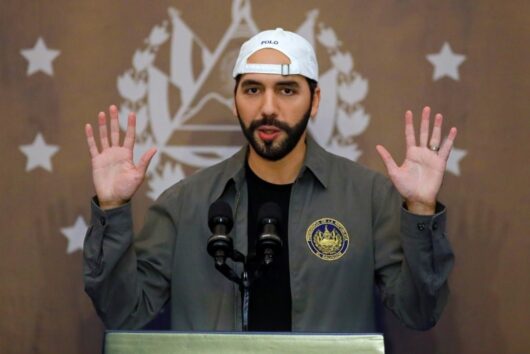Last week in review: Biden administration pushes for crypto forensics

Hacker group Anonymous has supposedly put Elon Musk in their crosshairs for his crypto Tweets, but is it all it seems? Meanwhile, El Salvador is going all in on Bitcoin, the Biden administration is looking to harness blockchain’s forensic power, and more. Here are our picks of the biggest crypto stories to come out of last week.
El Salvador to implement new Bitcoin Standard
El Salvador’s controversial president, Nayib Bukele, has announced a legislative proposal to make bitcoin legal tender. If his plan is backed by congress, the Central American country would become the first in the world to formally adopt the digital currency.
The announcement came at the Bitcoin 2021 conference in Miami, Florida, where President Bukele explained: “In the short term, this will generate jobs and help provide financial inclusion to thousands outside the formal economy.”
In a later Twitter post, Bukele added that, “We hope that this decision will be just the beginning in providing a space where some of the leading innovators can reimagine the future of finance, potentially helping billions around the world.”
Around 70% of Salvadorans are currently without access to bank accounts or financial services and Bitcoin could provide a major test case of its value. The news was welcomed by crypto industry figures as a momentous step in the adoption of bitcoin around the world. Bitcoin pioneer Charlie Shrem, who was involved in the cryptocurrency’s early development, described it as a “major step towards hyperbitcoinization” that will further disrupt the traditional financial system.
It’s highly unlikely that Bukele’s bill will fail to be passed, as his party, New Ideas, controls El Salvador’s unicameral legislature.
Biden administration pushes for crypto forensics
The Biden administration has said it intends to take the fight to ransomware using crypto forensics. The news comes after meatpacker JBS confirmed that it had been impacted by an incident in which it received a demand from a “criminal organisation.”
Deputy Press Secretary, Karine Jean-Pierre, explained:“President Biden has already launched a rapid strategic review to address the increased threat of ransomware to include four lines of effort … [including] expanding cryptocurrency analysis to find and pursue criminal transaction[s],” she said.
Last month, ransomware group DarkSide, was responsible for shutting down the Colonial Pipeline, which supplies gas to America’s Eastern seaboard. The group received $90 million in bitcoin ransom payments, but this might only be temporary, as the strength and success of crypto forensics is growing at blistering speeds. The last high profile seizure of illicit bitcoin took place as recently as November 2021, where the FBI took control of 70,000 coins, equating to roughly $3 billion. How soon will light shine on DarkSide?
You can tweet, but you can’t hide
A YouTube video claiming to be from hacker collective Anonymous has turned its turrets of ‘justice’ toward Elon Musk. The video has condemned his bombastic Bitcoin tweets as having “destroyed lives” of hardworking people who’ve had “their dreams liquidated over your public temper tantrums.”
In their video, the cyber attack group also labels Musk as “nothing more than another narcissistic rich dude who is desperate for attention.” Anonymous have denied responsibility, blaming a splinter group, though they’re anonymous, so they would.
They also point to Musk’s hypocritical tendencies, stating:
“It appears that your quest to save the world is rooted in a superiority and savior complex rather than it is an actual concern for humanity. This has been obvious to your employees for a long time, who have faced intolerable conditions under your command for years.
“It is also obvious to the young children working in your overseas lithium mines which are destroying the local environment as well.”
After the nearly four-minute long exposé on Musk, it isn’t clear what the group’s next move is, but the clip ends with their signature sign-off. “You may think you are the smartest person in the room, but now you have met your match. We are Anonymous! We are Legion! Expect us.”
Bitcoin goes full throttle at Indy 500
Bitcoin made its debut appearance at the 105th edition of the Indianapolis 500, the largest single-day sporting event in the world. IndyCar Series driver and team owner Ed Carpenter dressed his Chevrolet-powered Dallara in an eye-catching Bitcoin-themed livery, and eventually crossed the line in eighth place.
P8 in my second #Indy500. Led 32 laps and was right in contention to win the race. A few unfortunate moments on the last pit cycle sent us back down the field. After all, awesome month of May and really proud at everyone @ecrindy, the #Bitcoin car was insanely fast! pic.twitter.com/L9uzIx9XfU
— Rinus VeeKay (@rinusveekay) May 30, 2021
“To bring my personal interest and immersion in Bitcoin to our industry is historic,” Carpenter said in early May “… I see it as an opportunity to transform how we operate within our own motorsport industry.”
Motorsport is notoriously expensive, and as a result, very difficult to enter. Yet, cryptocurrencies like Bitcoin can be an innovative way to drive change, said Carpenter.
“We’re a sponsorship-driven industry and it’s getting harder to compete in the space with other race teams, with other marketers with other sports properties,” he told AutoWeek. “I’ve been getting involved with this, and I see a lot of opportunity to change the way we do business.”
Making history, the No. 21 car was the first to run a decentralised sponsorship in the series. Throughout the month of May, payments app Strike raised funds for the team, allowing them to participate in the event.
NFTs: A traditional collector’s delight
The 2020 Olympic games was set to bring together the world’s top athletes to compete for gold. Instead, the event has been beset with problems and delays, leaving many wondering if it would be cancelled altogether. There have only been three instances where the Olympics have been cancelled, due to the World Wars. Fortunately, alternative dates for 23 Jul 2021–08 Aug 2021 have been arranged.
This means the tradition of Olympic pin trading will continue, albeit a little differently in 2021.
Due to COVID-19 restrictions, international spectators will be prohibited from attending the event, leaving many passionate pin collectors without an opportunity to trade with each other. To keep the tradition alive, the International Olympic Committee (IOC) the NGO that organises the Summer and Winter Olympic Games, has teamed up with video game developer nWay to launch a collection of non-fungible tokens that represent collectible Olympic pins.

Managing Director of the IOC television and marketing services, Timo Lumme said the Committee is excited to see this new era of pins:
“Olympic pins started as a way to identify athletes, judges, and officials, but over the past 125 years, it has become an Olympic Games tradition,” noted Timo Lumme. “[The] announcement is a natural evolution of this tradition.”
Once again, crypto saves the day by flexing its use case muscles.
 Discover
Discover Help Centre
Help Centre Status
Status Company
Company Careers
Careers Press
Press


